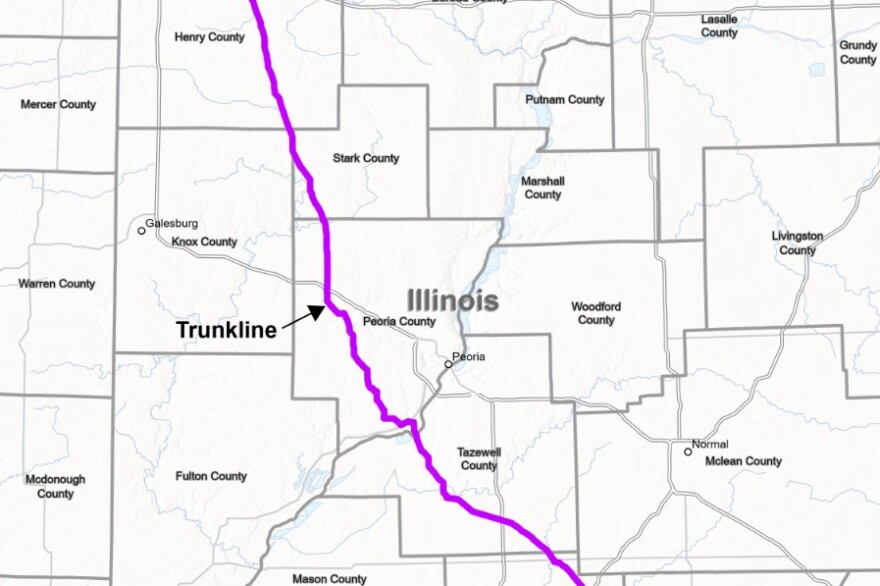The company behind a sometimes-controversial carbon capture pipeline officially filed its application with state regulators last week. The new preferred route appears to dodge entirely a particular point of contention in the city of Peoria.
Wolf Carbon Solutions' Mt. Simon Hub pipeline system would transport up to 12 million metric tons a year of captured carbon dioxide from two Archer Daniels Midland ethanol plants in Cedar Rapids and Clinton, Iowa to a permanent underground sequestration site in Decatur.
A spur of the 260-mile long pipeline was slated to head through the south side of Peoria up to the BioUrja ethanol plant, but it appears that's not in the current iteration of the proposal filed Friday with the Illinois Commerce Commission.
Instead, the map shows the pipeline routing south through or near the portion of Tazewell County where Pekin is located. That city also has an ethanol plant, operated by Alto Ingredients.
Central Illinois' geology is deemed particularly well-suited for the purpose, with a layer of impermeable shale preventing the upward escape of liquefied CO2 that's stored in a deeper layer of porous sandstone.
"The Mt. Simon Hub is a world-class carbon capture and storage system that would harness the full potential of this area to help achieve regional, national, and global carbon reduction goals through industrial decarbonization," said Wolf Carbon Solutions Senior Vice President of Corporate Development Nick Noppinger in a statement.
In Illinois, the pipeline route passes through Rock Island, Henry, Stark, Knox, Peoria, Tazewell, Logan, DeWitt, and Macon counties.
Last year's Inflation Reduction Act passed by Congress bolstered the value of tax credits available to companies investing in carbon capture technology. Wolf Carbon Solutions said the pipeline will support 2,780 jobs during construction and 342 jobs in Illinois after completion. The Prairie Research Institute at the University of Illinois Urbana-Champaign estimates pipeines will generate a $3.3 billion regional economic impact over 30 years.
The company plans to draw labor from various unions in Central Illinois, including the International Union of Operating Engineers Local 649 and Teamsters Local 627 in Peoria; and Laborers' Local 231 in Pekin. Total project costs are estimated at about $1 billion in regulatory documents.
Proponents of the pipelines say they reduce greenhouse gas emissions into the atmosphere from ethanol plants and other carbon dioxide emitters, but detractors say they are unsafe and a smokescreen for companies avoiding better climate solutions.
The U.S. Pipeline and Hazardous Materials Safety Administration, or PHMSA, is revising federal regulations in the wake of a 2020 pipeline rupture in Sartaria, Miss. that led to 46 hospitalizations and more than 300 evacuations. High concentrations of odorless and hazardous carbon dioxide can lead to asphyxiation.
Skeptics of the pipeline effort say Wolf Carbon Solutions and other companies should wait until those revisions are released before moving ahead with development.
South Side residents and environmental advocates raised concerns about the health impacts of a pipeline rupture within the neighborhood, which has a majority Black population and is one of the poorest ZIP codes in the United States.
"ADM/Wolf appears to be doing everything possible to fast track this project—from suddenly taking the controversial spur through Peoria’s South side off the map ‘for now,’ to publicly promising to meet yet-to-be-drafted federal CO2 pipeline safety regulations,” said Tracy Fox of the Central Illinois Healthy Community Alliance and the Coalition to Stop CO2 Pipelines in a statement sent Monday.
A bill meant to impose a moratorium on new pipeline construction until the updated federal rules are introduced fizzled out in the last session of the Illinois General Assembly, as did legislation that would have barred companies from employing eminent domain powers to acquire land rights for the pipelines.
"It’s frighteningly clear that Wolf Carbon Solutions is hoping for swift approval of its pipeline project, despite the fact that most people are not even aware of it or how it might affect them," said Joyce Blumenshine of the Heart of Illinois Sierra Club. "The people, land, and water resources of Illinois should not be at the disposal of CO2 corporations for their own financial gain."
Noppinger claims regulatory requirements have prevented the company from directly communicating with impacted landowners, but they plan to ramp up their outreach in the coming weeks.
The Peoria Park District board of trustees moved last week to impose a moratorium on pipeline development through its properties. No other government body in the Peoria area has taken a similar action to date.
The company said it's working to identify "high consequence areas" on the pipeline route. As defined by PHMSA, that includes urban areas, drinking water sources, and sensitive ecological areas.
The Wolf Carbon Solutions application said shutoff values would be located no more than 7.5 miles apart between main line valves in these areas. Vice president of engineering Patrick Brierley said the company will also have an automatic call alert system for authorities and first responders in the event of an emergency.
The current company timeline calls for construction to begin in the second quarter of 2024, with operations beginning in 2025.


